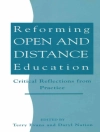Drawing extensively on personal experiences, this important volume looks at sexuality and relationships in the lives of people with intellectual disabilities, painting a genuine picture of the range of sexualities and relationships people want.
Honest and reflective, it shows how sexuality has been managed and controlled in different countries. It explores a range of issues such as rights, resilience, protection, sexual oppression and the lack of privacy for those living in care institutions. Co-edited and with contributions by people with intellectual disabilities and allies, this unique book offers an authentic account of the challenges people face and what society needs to do to respect people’s rights.
Providing insight into a morally, ethically and legally complex area, this book will be essential reading for people with intellectual disabilities, their advocates, families and supporters; social care managers, social workers, and other professionals working in the field as well as academic researchers and students.
สารบัญ
Introduction: Rohhss Chapman, Louise Townson, Sue Ledger and Daniel Docherty. Ch2: Stories from Around the Globe. Sue Ledger, Rohhss Chapman, Louise Townson. Ch3: Intimacy and Oppression: a Historical Perspective, Lee-Ann Monk, La Trobe University, Australia. Ch4: The Story of Ebba and Jonni: This is Our Story, Eyglo Ebba Hreinsdottir and Sigurjon Jonni Gretarsson with Guorun V.Stefansdottir. Ch5: I Would Have Broken the Law Several Times: Clare Inclusive Research Group, Ger Minogue, Martin Corry, Marie Deely, Patrick Kearney, Joe Mc Grath, Kathleen O’Leary and Pauline Skehan with Rob Hopkins and Kelley Johnson. Ch6: ‘Once in Six Weeks? That’s Not a Relationship!’, Our New Future Group with Toon Maillard. Ch7:The Paradox of Intimacy in Japan: Shifting Objects of Affection. Eiji Tsuda, University of Kobe, Japan and Takako Ueto. Ch8: The Maltese Odyssey, Claire Azzopardi-Lane with an introduction by Louise Townson. Ch9: ‘Molly is Just Like Me’: Peer Education and Life Stories in Sexuality Programs in Australia. Ch10: Emergent Themes from Part one, Sue Ledger, Rohhss Chapman and Louise Townson. Ch11: Law, Policy and Diversity: Exploring the Gap Between Rhetoric and Real Life, Sue Ledger, Rohhss Chapman and Louise Townson. Ch12: Promoting Sexualalities and Protecting from Abuse, Rachel Fyson with an introduction by Louise Townson. Ch13: Far more people were able to have sex lives: managing sex relationships and reproductive control. Jan Walmsley, Jan Walmsley Associates, UK and Nigel Ingham, Community Service Volunteers (CSV), UK. CH14: This is my Time, My Life, the Way I Am’, Alice. Gay Women might need a Rainbow Fairy Group. Clare Miller, Adam Koronka, Lindy Shufflebotham with Sue Ledger. Ch16: Good as You Too(GAY2), Craig Blyth with Daniel Docherty. Ch17: ‘I Have Been Blessed to Have a Very Good Support Worker’: Experiences Related to Ethnicity and Diversity, Jakie Downer with Linnette Farquarson. CH18: The Final Frontier: Young People with Learning Difficulties and Sex Education, Ruth Garbutt with an introduction by Lyndon Strickland. Ch19: Women Like Soaps and Men Like Football’: The Men’s Room, Bill, Peter and Alan with Niall Mc Nulty. Ch20: Intellectually Disabled People who Sell or are Sold for Sex in the UK: An Exploration, Craig Blyth and Rohhss Chapman. Ch21: Working in Partnership:The Editor’s Stories, Rohhss Chapman, Louise Townson and Sue Ledger. Ch22: Emerging Themes from Part two, Rohhss Chapman, Sue Ledger and Louise Townson. Ch23: Re-Visiting the Research Questions and Future Recommendations, Rohhss Chapman, Sue Ledger and Louise Townson.
เกี่ยวกับผู้แต่ง
Kelley Johnson is Professor of Disability, Policy and Practice at the University of Bristol, and Director of the Norah Fry Research Centre.












